Preparing for a Background Check: A Step-by-Step Guide

Understanding Background Checks and Why Preparation Matters
Background checks are an integral part of modern hiring processes, providing employers with vital insights about potential hires. Whether you’re applying for a job, renting a property, or seeking a professional license, it’s important to understand what a background check entails and why preparation is essential. This guide will explore the types of background checks, their significance, and the reasons why being prepared can set you up for success.
What Is a Background Check?
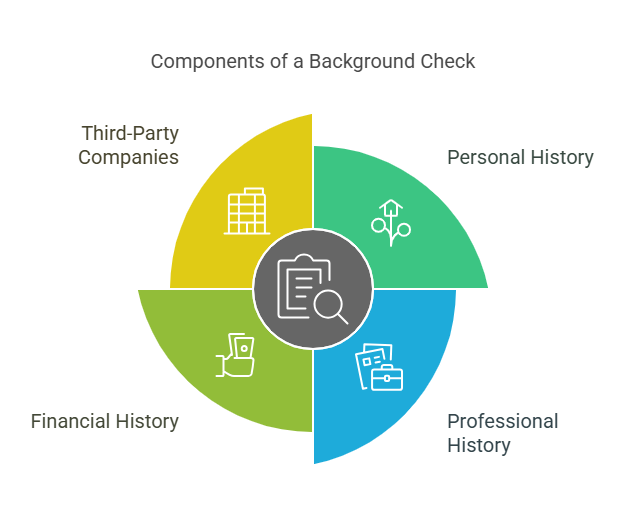
A background check is a systematic process used to verify an individual’s history and credentials. Employers, landlords, and other organizations use background checks to confirm that the information provided by an individual is accurate and to assess any potential risks.
Depending on the context, background checks may review various aspects of your personal, professional, and financial history. They are often conducted by third-party screening companies, like Exact Background Checks, which specialize in compiling and verifying data from multiple sources to deliver a comprehensive report.
Why Employers Conduct Background Checks
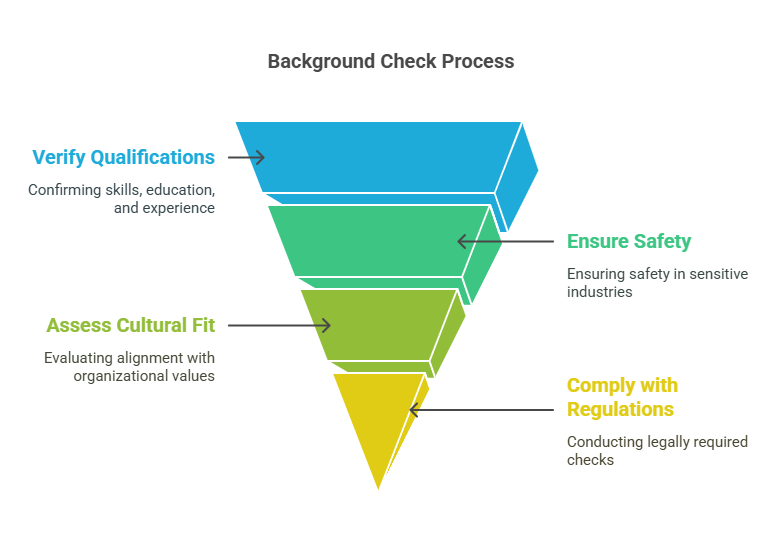
Employers perform background checks to make informed decisions and mitigate risks. The hiring process is costly, and bringing the wrong candidate on board can lead to financial, operational, and reputational damage. Background checks allow employers to:
- Verify Qualifications: Employers need to confirm that a candidate possesses the skills, education, and experience they claim to have.
- Ensure Safety and Security: Particularly in industries like healthcare, education, and childcare, background checks are critical to ensuring the safety of employees, customers, and the public.
- Assess Cultural Fit: Reference checks and employment history reviews help employers gauge whether a candidate aligns with their organizational values.
- Comply with Regulations: Certain industries, such as finance and transportation, are legally required to conduct specific types of background checks to adhere to government regulations.
Types of Background Checks
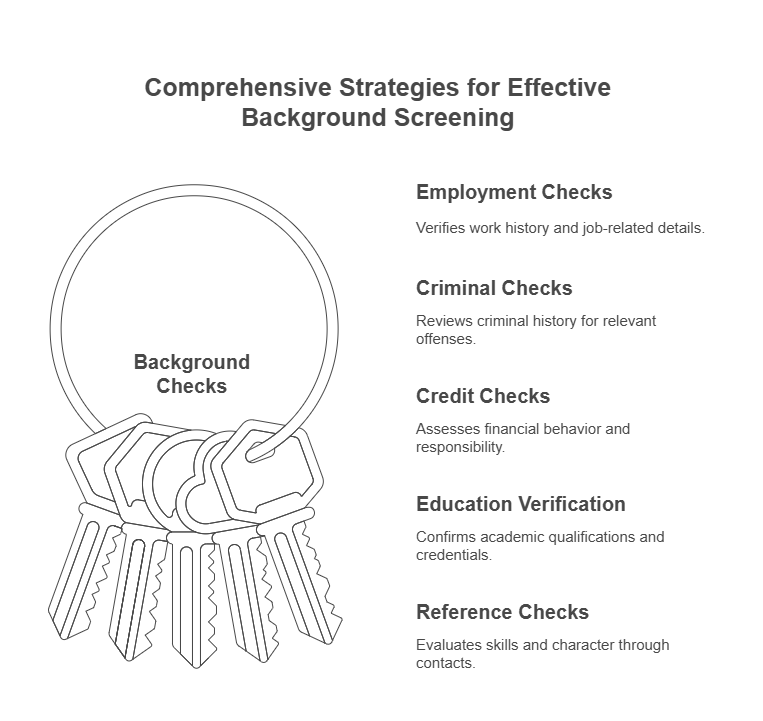
There are various types of background checks, each tailored to the needs of the organization or industry. Below are the most common types:
1. Employment Background Checks
These are the most comprehensive and frequently used background checks in hiring. They verify a candidate’s work history, including:
- Job titles and responsibilities
- Dates of employment
- Reasons for leaving past jobs
Employers use this information to confirm that the candidate’s resume accurately reflects their professional experience.
2. Criminal Background Checks
Criminal background checks review an individual’s criminal record to identify any history of arrests, charges, or convictions. While not all criminal records disqualify a candidate, employers typically look for offenses that may impact the role’s responsibilities, such as theft for a financial position or violence for a customer-facing role.
3. Credit Checks
Credit checks are often conducted for roles that involve handling finances, sensitive data, or executive decision-making. These checks assess financial behavior, including:
- Payment history
- Debt levels
- Bankruptcies
Employers use this information to gauge financial responsibility and potential risks.
4. Education Verification
Education verification ensures that a candidate has the degrees, certifications, or licenses they claim. This step is especially important for roles that require specialized knowledge or credentials, such as engineering, law, or medicine.
5. Reference Checks
Reference checks involve contacting individuals listed by the candidate to verify their skills, work ethic, and character. Employers often ask references about the candidate’s performance, interpersonal skills, and overall suitability for the role.
6. Driving Record Checks
For positions involving transportation or driving, employers may review an applicant’s driving history. This includes checking for traffic violations, DUIs, and license validity.
7. Drug Testing
Drug tests are sometimes included in background checks to ensure workplace safety and compliance with company policies or industry regulations.
Each type of check serves a unique purpose, and employers often use a combination of these to ensure they make well-informed decisions.
The Importance of Preparing for a Background Check
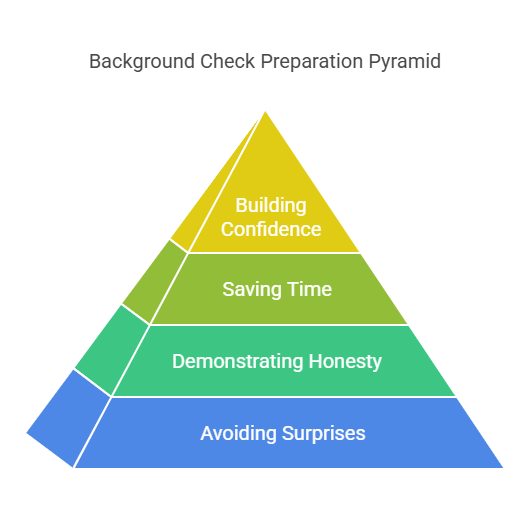
Preparing for a background check is not just about avoiding negative outcomes; it’s also an opportunity to present yourself in the best possible light. Here’s why preparation matters:
1. Avoiding Surprises
Without preparation, you may be caught off guard by the results of your background check. This could include outdated or incorrect information, such as unresolved traffic violations or errors in your employment history. By reviewing your records beforehand, you can address these issues proactively.
2. Demonstrating Honesty
Employers value integrity, and being upfront about your history shows that you are trustworthy. If there are discrepancies between your application and your background check, it’s better to explain them in advance than to let the employer discover them later.
3. Saving Time and Effort
Discrepancies or red flags in your background check can delay the hiring process or even jeopardize your chances of getting the job. Preparing in advance helps streamline the process and ensures that your information aligns with what the employer is looking for.
4. Building Confidence
Knowing that you’ve thoroughly prepared for a background check can boost your confidence during interviews and other interactions with potential employers.
Consequences of Failing to Prepare
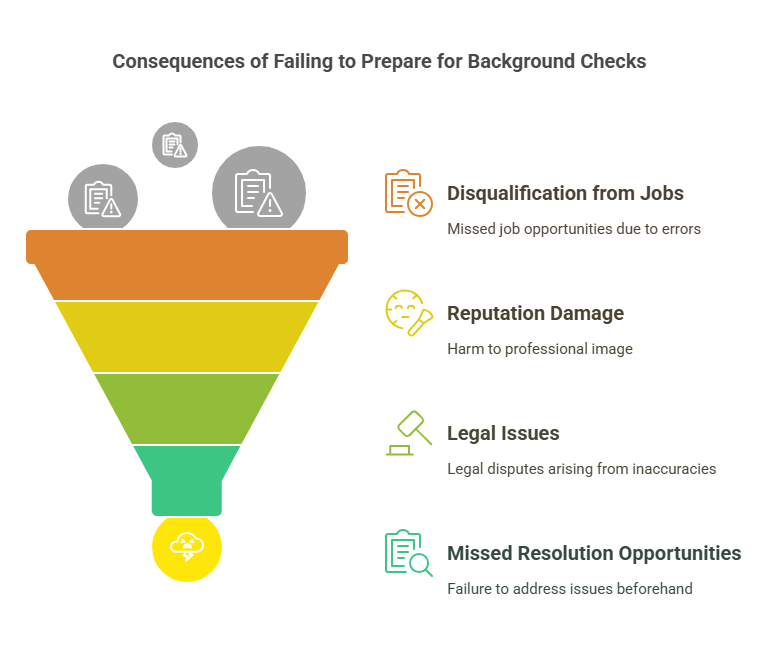
Failing to prepare for a background check can have serious repercussions, such as:
- Disqualification from Job Opportunities
Even minor inaccuracies in your records can lead to disqualification, especially in competitive industries. For example, a missed certification verification could cost you a role that requires specific qualifications. - Damage to Reputation
Employers may view discrepancies as a sign of dishonesty or negligence, which can harm your professional reputation. - Legal and Financial Issues
Inaccurate background check results can lead to legal disputes, especially if they result in wrongful termination or lost job opportunities. - Missed Opportunities for Resolution
Without preparation, you may miss the chance to address potential red flags or inaccuracies before they are discovered by the employer.
The Role of Exact Background Checks
Companies like Exact Background Checks play a vital role in the screening process. They ensure that background checks are accurate, thorough, and compliant with legal standards. Exact Background Checks offers:
- Accurate Reporting: By using state-of-the-art technology and certified practices, they minimize errors in background checks.
- Customized Screening Solutions: They tailor their services to meet the specific needs of employers, ensuring that all relevant information is reviewed.
- Support for Job Seekers: They provide resources and guidance to help individuals understand and prepare for background checks.
Partnering with a reliable screening company ensures a fair and transparent process for both employers and candidates.
How Common Are Background Check Errors?
Errors in background checks are more common than you might think. According to the National Consumer Law Center, inaccuracies in criminal records, credit reports, and employment histories frequently occur due to:
- Outdated Records: Public databases may not always be updated to reflect expungements or other changes.
- Data Entry Errors: Typos or incorrect information can lead to mismatches or inaccuracies.
- Misidentification: Common names or shared identifiers (like Social Security numbers) can result in mixed-up records.
These errors highlight the importance of reviewing your records and working with reputable screening providers like Exact Background Checks.
Step-by-Step Guide to Properly Prepare for a Background Check
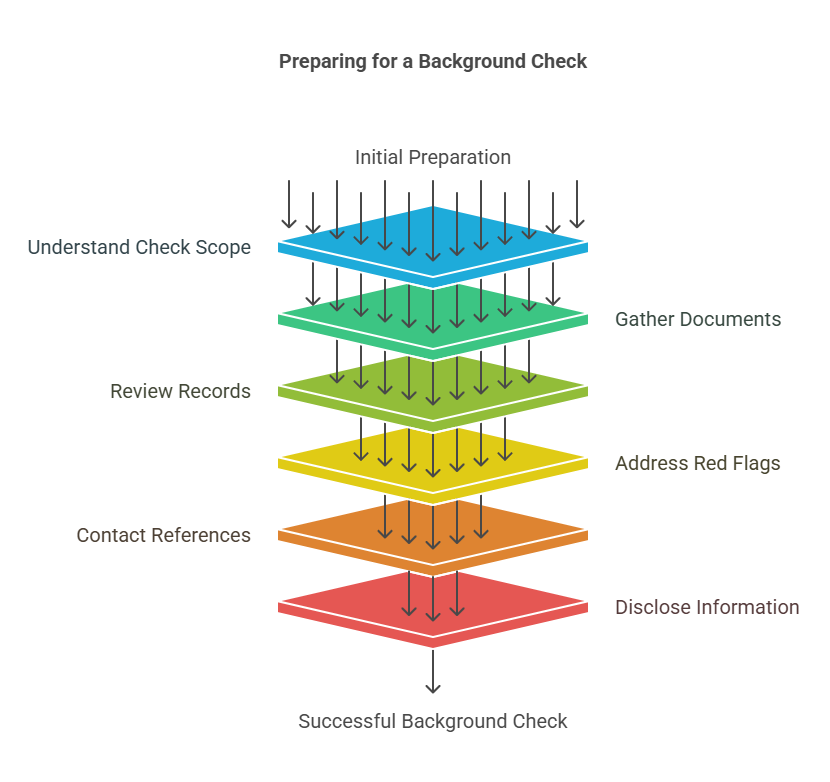
Preparing for a background check is a proactive step toward ensuring that your history aligns with your application. Proper preparation can minimize surprises, address potential issues, and present you as a trustworthy and responsible candidate. This section provides a detailed, step-by-step guide to help you get ready for a background check, whether it’s for employment, tenancy, or licensing.
Step 1: Understand the Scope of the Background Check
The first step is to understand what type of background check will be conducted. Different checks focus on specific aspects of your history:
- Employment Background Check: Verifies work history, job titles, and performance.
- Criminal Background Check: Looks for past convictions, pending charges, or arrest records.
- Education Verification: Confirms degrees, certifications, and institutions attended.
- Credit Check: Assesses financial responsibility, often for roles involving finances.
- Reference Check: Contacts individuals to verify your skills and character.
- Drug Testing: Ensures compliance with workplace safety policies.
Ask the employer, landlord, or organization conducting the check what will be included so you can focus your preparation accordingly.
Step 2: Gather Relevant Documents
Having all relevant documents on hand will help you verify your information and address any discrepancies quickly. Compile the following:
- Personal Identification: Valid ID, Social Security card, and any other required identification.
- Resume and Job Application: Ensure your resume matches the information you’ve provided to the employer.
- Educational Records: Diplomas, transcripts, and certifications.
- Employment Records: Pay stubs, W-2 forms, and reference letters from previous jobs.
- Financial Documents: Credit reports and records of resolved debts (if a credit check is included).
- Court Records: Documentation of resolved legal issues, such as expunged criminal records or settlements.
Organize these documents in a folder or digital file for easy access.
Step 3: Review Your Records
Take the time to review your records to ensure they are accurate and up to date. This includes:
- Credit Report: Request a free credit report from websites like AnnualCreditReport.com. Look for inaccuracies such as outdated debts or incorrect account statuses.
- Criminal Records: Conduct a self-check to see if any outdated or incorrect information appears. Services like Exact Background Checks can assist with personal criminal record reviews.
- Driving Records: Obtain a copy of your driving history if the position involves operating a vehicle.
- Social Media Accounts: Review your social media profiles for content that could be deemed unprofessional or controversial.
Correcting inaccuracies before the background check can save time and prevent misunderstandings.
Step 4: Address Potential Red Flags
If you identify potential red flags in your records, address them proactively:
- Criminal Records: If you have a criminal history, check if records have been expunged or sealed. Be prepared to explain any convictions honestly and emphasize rehabilitation efforts.
- Employment Gaps: Address gaps in your work history by explaining legitimate reasons, such as education, caregiving, or freelance work.
- Credit Issues: If your credit report shows negative marks, be ready to explain circumstances and provide evidence of improved financial management.
- Educational Discrepancies: Verify that the details of your education, such as graduation dates and institutions, are accurate.
Step 5: Contact References
References play a critical role in the background check process. Notify your references in advance and provide them with relevant details about the position.
- Choose Reliable References: Select individuals who can vouch for your skills, work ethic, and character. This may include former supervisors, colleagues, or professors.
- Update Their Contact Information: Ensure your references’ phone numbers and email addresses are current.
- Prepare Them: Share the job description and key talking points so they can provide informed responses.
Proactively engaging with your references demonstrates professionalism and ensures they are ready to respond promptly.
Step 6: Disclose Necessary Information to the Employer
Honesty is the best policy during the background check process. If you’re aware of any potential issues, disclose them upfront to your employer. For example:
- Inform the employer if you have a criminal record and explain the circumstances.
- Discuss gaps in your resume and provide reasons for them.
- Clarify if your legal name differs from what appears on your records (e.g., due to a name change).
Employers appreciate transparency and are more likely to view you favorably if you address issues before they appear in the background check.
Step 7: Be Aware of Your Rights
Understanding your legal rights is critical when preparing for a background check. Under the Fair Credit Reporting Act (FCRA):
- You Must Be Notified: Employers must obtain your written consent before conducting a background check.
- You Can Review the Results: If an adverse action (e.g., job offer withdrawal) is based on the check, you have the right to review the results and dispute inaccuracies.
- You Can Dispute Errors: If you find errors in the report, you can request a correction or retest.
Being aware of these rights empowers you to navigate the process with confidence.
Step 8: Partner with a Trusted Background Check Service
Working with a reliable screening company, like Exact Background Checks, ensures a smoother and more accurate process. Exact Background Checks offers:
- Comprehensive Screening: They verify education, employment, criminal records, and more.
- Error Resolution Support: If inaccuracies are found, they assist in correcting them promptly.
- Guidance for Job Seekers: They provide resources to help candidates prepare effectively for background checks.
Using a trusted service gives both employers and candidates peace of mind.
Step 9: Follow Up After the Background Check
After the background check is complete, follow up with the employer to confirm they have received the results. If there are any delays or discrepancies, be proactive in addressing them.
- Ask for Feedback: If the background check reveals any issues, request an opportunity to explain or clarify.
- Request a Copy of the Report: Review the report to ensure all information is accurate.
Tips for Preparing for Specific Types of Background Checks
Criminal Background Checks
- Obtain a copy of your criminal record to verify accuracy.
- Check state-specific laws regarding what employers can access.
Credit Checks
- Reduce outstanding debts and resolve disputes before the check.
- Be prepared to explain any negative marks in your credit history.
Employment Verification
- Confirm the accuracy of job titles, dates, and responsibilities listed on your resume.
- Provide contact information for previous employers if requested.
Social Media Screening
- Review your profiles for professionalism.
- Adjust privacy settings to limit access to personal content.
Common Mistakes to Avoid
- Failing to Review Your Records: Neglecting to check your own records can lead to surprises during the screening process.
- Providing Inconsistent Information: Ensure your resume, application, and records align perfectly.
- Ignoring Red Flags: Address potential issues upfront rather than hoping they won’t be discovered.
- Neglecting References: Poor communication with references can lead to missed opportunities.
Legal Aspects of Background Checks
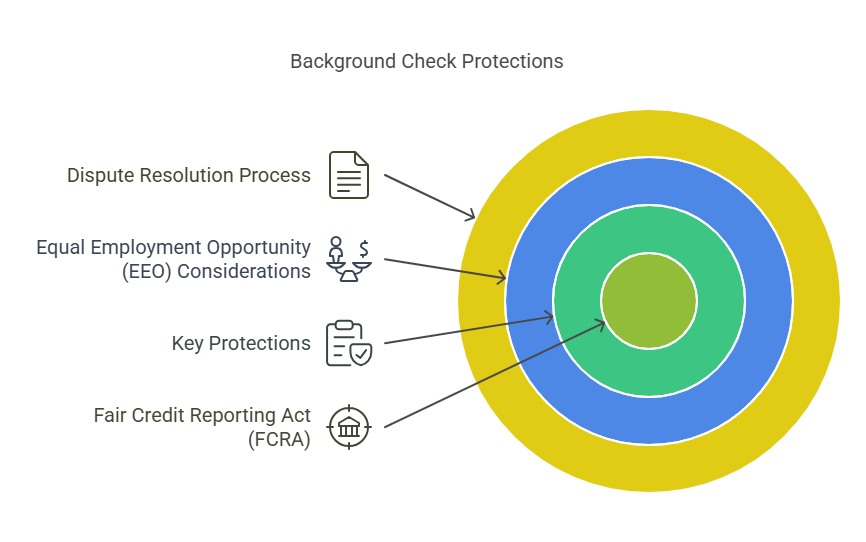
When undergoing a background check, individuals have specific legal rights that must be protected under various laws. One of the most important pieces of legislation governing background checks in the United States is the Fair Credit Reporting Act (FCRA).
Fair Credit Reporting Act (FCRA) Compliance
The FCRA sets standards for the collection, use, and dissemination of background check information. It ensures that employers obtain permission from candidates before conducting a background check and provides individuals with the right to dispute any inaccurate information that may surface during the process.
Key FCRA Protections for Job Applicants:
- Informed Consent: Employers must obtain written consent from the individual before conducting a background check.
- Notification: If an employer decides not to hire an individual based on the findings of a background check, they must notify the individual in writing and provide them with a copy of the report.
- Dispute Process: If a background check contains errors, individuals have the right to dispute the information. The employer must then verify the accuracy of the report before making any decisions based on it.
Equal Employment Opportunity (EEO) Considerations
The Equal Employment Opportunity Commission (EEOC) ensures that the background check process does not discriminate against applicants based on race, color, religion, sex, national origin, age, disability, or genetic information. This means employers must apply background check procedures consistently to all candidates and cannot allow irrelevant factors, such as race or gender, to influence their hiring decisions.
Employers must also be cautious about ban the box legislation, which restricts when they can ask about criminal convictions. In certain states and cities, employers are prohibited from asking about criminal history during the initial stages of the hiring process to provide candidates a fair chance at employment.
Background Check Dispute Resolution
If an individual believes that the results of their background check are inaccurate or incomplete, they can request a correction. Dispute resolution typically involves:
- Contacting the background check provider (such as Exact Background Checks) to inform them of the discrepancies.
- Providing supporting documentation to prove the error (e.g., court documents showing an arrest record was expunged).
- If the error is not resolved directly, individuals can file complaints with the Consumer Financial Protection Bureau (CFPB) or take legal action.
Frequently Asked Questions (FAQs)
What are the main types of background checks used by employers?
The main types of background checks include employment background checks, criminal background checks, credit checks, education verification, reference checks, driving record checks, and drug testing.
Why is it important to prepare for a background check?
reparing for a background check helps you avoid surprises, demonstrate honesty, save time and effort, and build confidence in the hiring process.
What are some common errors that can occur in background checks?
Common background check errors include outdated records, data entry errors, and misidentification
What are my rights during a background check?
Under the Fair Credit Reporting Act (FCRA), you have the right to informed consent, notification if an adverse action is taken, and the right to dispute errors in the report.
How can I prepare for a criminal background check?
To prepare for a criminal background check, obtain a copy of your criminal record to verify accuracy and check state-specific laws regarding what employers can access.
Conclusion
Properly preparing for a background check is essential for job candidates to ensure that the process goes smoothly and does not derail their chances of securing employment. By understanding the background check process, following the necessary steps to prepare, and being aware of your legal rights, you can navigate the process confidently. It’s important to approach any potential discrepancies head-on and be proactive in addressing any red flags before they impact your job prospects.
Employers, too, must ensure that their background screening practices are fair, transparent, and compliant with legal standards, allowing both parties to enter into a successful, informed employment relationship. By choosing reliable services like Exact Background Checks, individuals and businesses alike can ensure that the screening process is accurate and comprehensive, ultimately leading to better hiring decisions.



